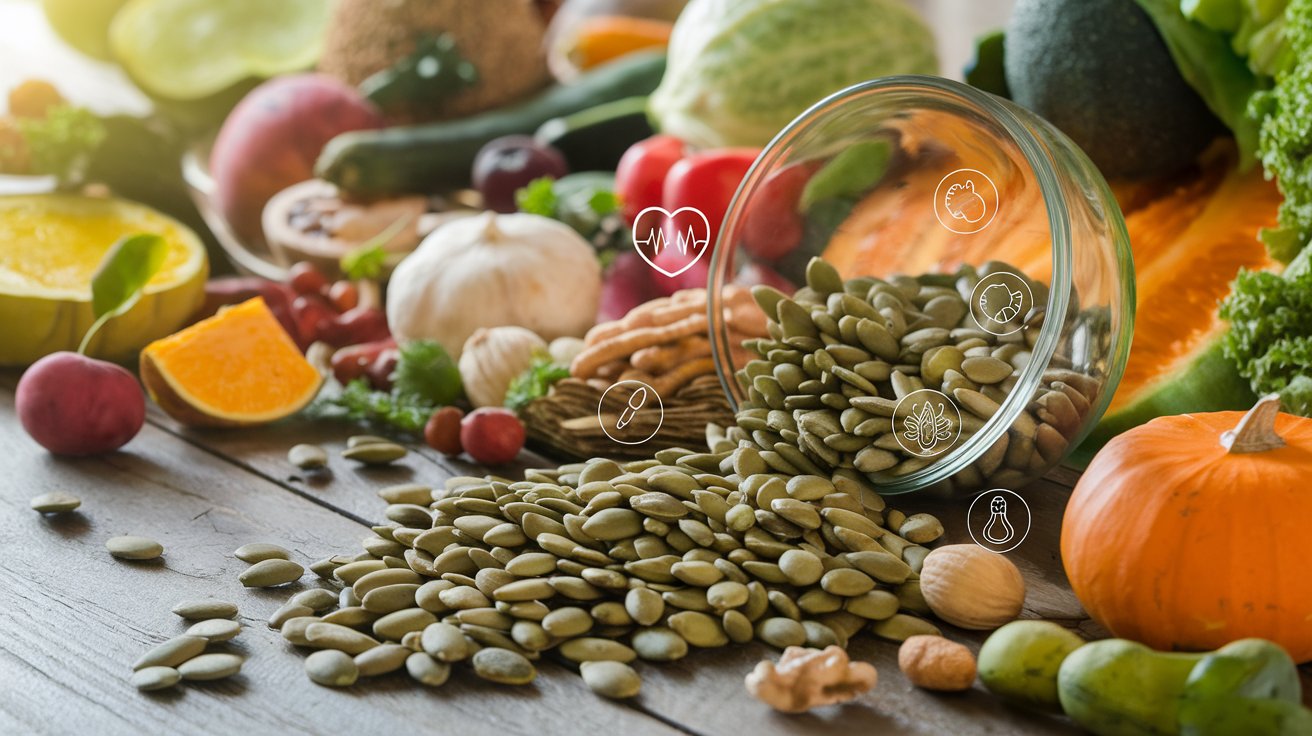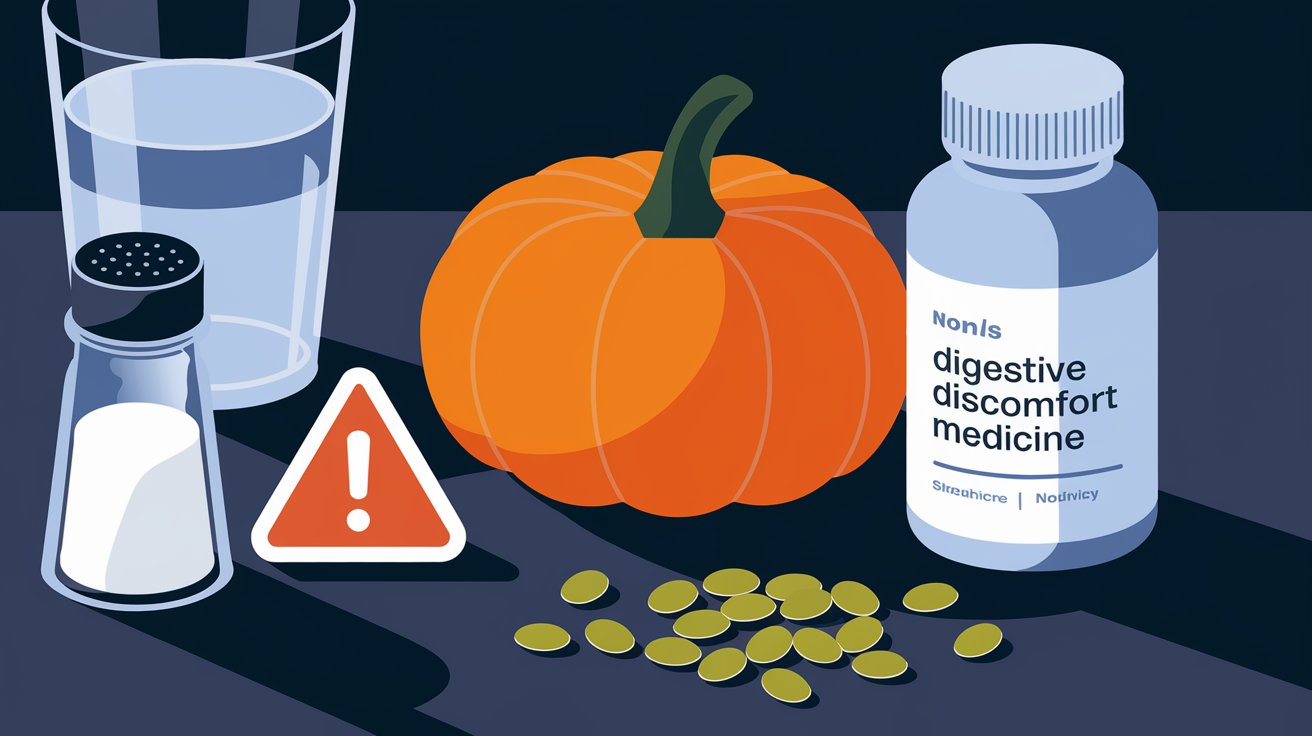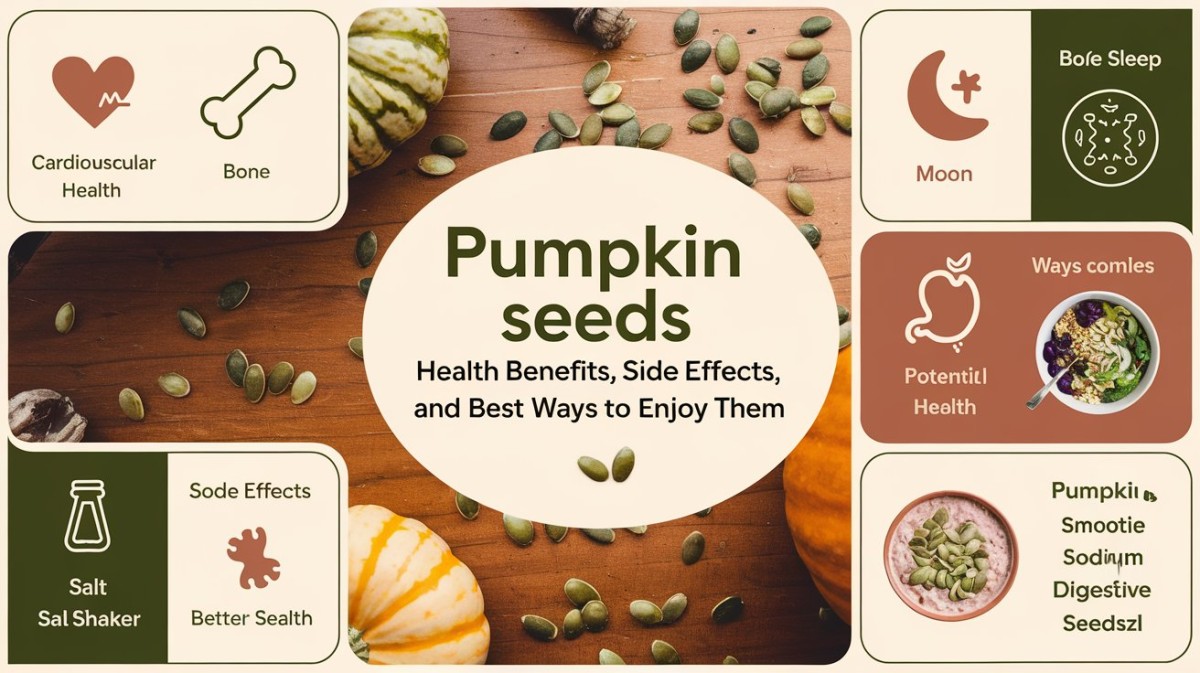Have you ever thought about why pumpkin seeds are consider to be one of the best superfoods one can eat? These tiny seeds contain a lot of nutrients and are rapidly becoming popular with health conscious people across the globe. Some of the benefits which are associated with the take of pumpkin seeds include improvement of the heart health. However as it is with every food, they also have some inconveniences. Now let’s consider what benefits and risks pumpkin seeds have, and how it is possible to use them properly.
Advantages of Pumpkin Seeds

Nutrient-Dense Powerhouse
While traditionally they are referred to as pumpkin seeds or pepitas, pumpkin seeds are definitely treasure troves of nutrients. An individual serving is a well balance portion of protein, unsaturated fat, fibre, magnesium, zinc, iron and vitamin E antioxidants. These nutrients have so many uses in the body such as in the immune system, muscle contractions and to supply energy.
Heart Health Booster
Another nutrient you’ll find in pumpkin seeds is magnesium that helps in controlling high blood pressure and high blood sugar levels that are essential for healthy heart functioning. They also have unsaturated fats and antioxidants that help to bring down inflammation and cholesterol thus decreasing chances of heart disease.
Rich Source of Antioxidants
Pumpkin seeds contain vitamins and minerals, carotenoids and vitamin E that assists to eradicate oxidative stress and inflammation in the body. These antioxidants combat free radicals preventing the damage to cells hence promoting general health and deanliness of chronic diseases such as cancers.
Improves Prostate Health
Prostate health is important for men and pumpkin seeds offer a lot of zinc, which help prevent prostate problems. Pumpkin seeds are also said to play a role in decreasing the likelihood or reducing some symptoms of benign prostatic hyperplasia or (BPH), which causes the prostate to swell.
Promotes Quality Sleep
But for many people having sleepless nights, then pumpkin seeds are your best bet. Try complete list of foods that contain tryptophan, an amino acid on which the body depends when it comes to production of serotonin which is a very important neurotransmitter responsible for sleep. When pumpkin seeds are consumed together with a source of carbohydrates, say fruits, it boosts serotonin levels and thereby improves sleep.
Supports Weight Management
Pumpkin seeds contain a lot of protein, fiber and these are qualities that help in achieving the foods bulk and helping one to eat less. Incorporating them in meals or consuming them between meals can help folks follow a suitable diet making them essential for people with weight concerns.
Promotes Bone Health
According to the magnesium content in pumpkin seeds, they can even participate in the formulation and maintenance of bones. Daily magnesium intake is important to the health of our bones and decreasing the risk of osteoporosis and may be especially helpful for older adults. Furthermore, pumpkin seeds have phosphorus, which is also important for bones’ density and formation similar to Vitamin K.
Disadvantages of Pumpkin Seeds

Potential for Digestive Issues
There is fibre in pumpkin seeds and this is good for digestion but one can get bloated, feel gaseous or have stomach upsets if one takes too many at once, especially if they not used to foods high in fibre. These effects can be reduced however by consuming moderate portion sizes and ensuring proper hydration.
High Calorie and Fat Content
Despite being a source of health benefits and good fats, pumpkin seeds are high in calories and if consumed in excessive amounts will contribute highly to your intake. This is particularly important if you are counting your calorie intake as your moderators are likely to be consuming a lot of them.
Risk of Salt and Additive Overload
Stored pumpkin seeds usually contain roasted seeds with some extra ingredients to enhance their taste such as salt or other chemicals. Saturated sodium is dangerous for the health because it affects the blood pressure and could cause other diseases. It is better to take raw or unsalted roasted pumpkin seeds or fry them at home with less salt.
Possible Allergic Reactions
However, they should note that while it is exceedingly rare to be allergic to pumpkin seeds. The lungs may react with symptoms like itching and rashes, stomach with ulcers and heat with hives and in extreme cases anaphylaxis. As a caution, anyone with any ill health condition that is portrayed by some of the symptoms that may arise from the pumpkin seeds should stop using it and seek the advice of a doctor.
Interaction with Medications
High magnesium content in pumpkin seeds may have an impact with some sort of medicines including those which are used to treat conditions of blood pressure and diabetes. In case you are on certain medication schedules, it prudent to consult the doctor about the addition of pumpkin seed into you diet regimen.
How to Include Pumpkin Seeds in Your Diet

They can be incorporated in many meals because pumpkin seeds are quite flexible. Here are some creative ways to enjoy them:
❖ As a Snack: Consume pumpkin seeds with pumpkin raw, roasted, or after seasoning them slightly with salt. You can roast them at home with a little sea salt, chili powder, or garlic powder again helps put the taste on them without added salt.
❖ In Smoothies: Try adding a tablespoon of the pumpkin seeds to your morning smoothie which also gives the mixture a protein/fiber content and a nutty taste.
❖ In Salads: Accompany salads with roasted pumpkin seeds, you will get a crispy topping, which will also improve the nutritional profile of the dish.
❖ With Oatmeal or Yogurt: Consuming pumpkin seeds is as easy as incorporating it into your oatmeal, yogurt or chia pudding.
❖ As a Nut Butter Alternative: For those that are allergic to nuts, the pumpkin seed butter is the perfect substitute. Combine it with our bread for breakfast, or use it in other dishes as an exciting touch!
❖ In Baking: Desseminate pumpkin seeds for enhanced texture in home baked bread, muffins or energy bars.
For more such related content check out our blogs on Health Benefits.
Key Takeaways: Should You Eat Pumpkin Seeds?
Pumpkin seeds contain lots of nutrients and have many uses including improving the health of the heart, the digestive system and providing better sleep. However, it must be consumed with moderation to get rid of digestion issues or to control calorie consumption. Here’s a quick recap of the pros and cons:
❖ Pros: Rich in protein, magnesium, powerful antioxidant, good for heart and bones,helps in sleep, and effective for weight loss.
❖ Cons: If taken in large amounts, may lead to GI problems, a source of empty calories, could be an allergen, may interfere with some drugs.
Pumpkin seeds are great for consumption and fit nicely into a healthy diet plan as they are good for your health. Intriguingly, the human fascination with popcorn appears to have stuck; and, perfect for those who love adding seeds to their meals or blending them, these seeds add more nutritional punch to everything. So as long as you consume them in moderation, more importantly, watch those parts, and go for unsalted, no-preservative nuts, they are okay for you. Savor the helpful nutrients, but scrub out the nasty letdowns, and get your body the nutrient increase it requires!
